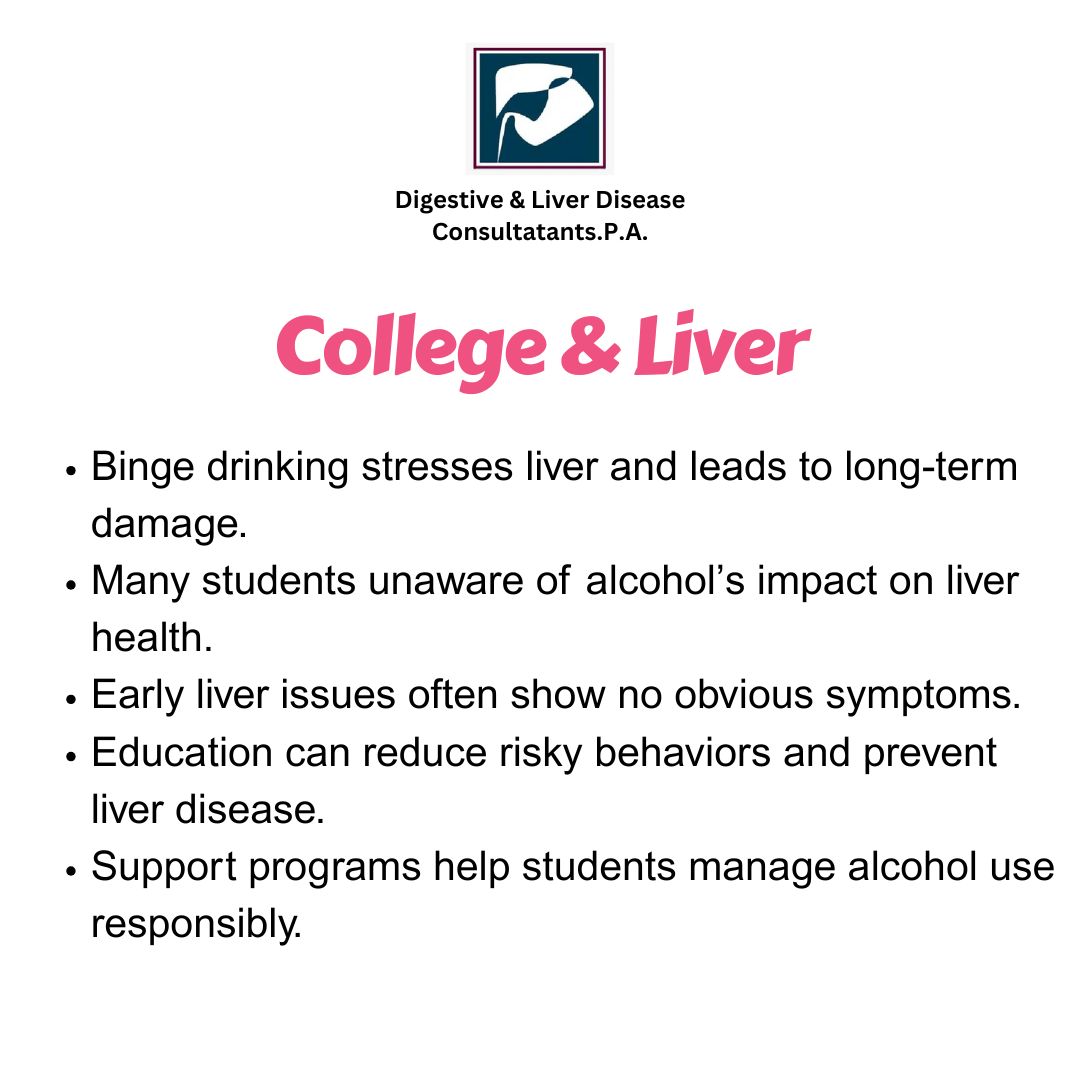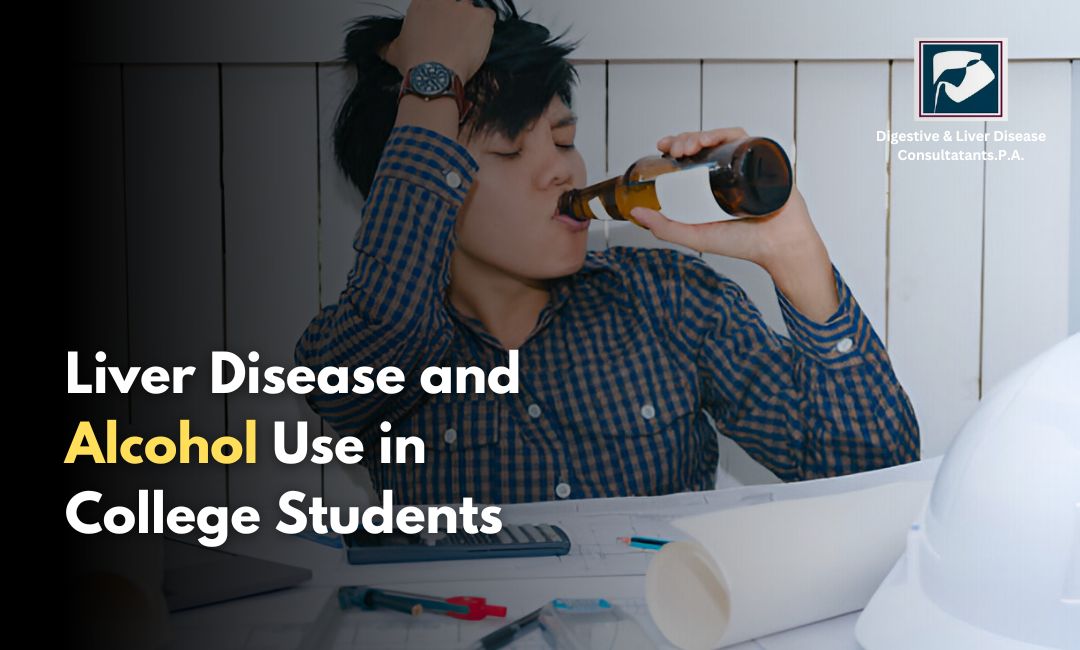College life is often filled with new experiences, challenges, and opportunities to grow. Unfortunately, it can also include risky behaviors like excessive alcohol consumption. Many college students don’t realize that drinking too much alcohol can seriously harm their liver and overall health. At Digestive & Liver Disease Consultants, P.A., we want to raise awareness about the risks of alcohol use and its impact on liver health, especially for young adults in college.
Why Is Alcohol Use Common Among College Students?
Alcohol is often part of social gatherings, parties, and celebrations on college campuses. Many students see drinking as a way to fit in, relieve stress, or have fun. While moderate drinking may not cause harm for some, heavy or frequent drinking can lead to serious health problems, including liver disease.
Studies show that binge drinking — drinking large amounts in a short time — is common among college students. This pattern of drinking puts the liver under tremendous stress and increases the risk of developing liver problems even at a young age.

Understanding the Liver and Its Role
The liver is a vital organ that performs many important functions in the body. It helps process nutrients, filters toxins from the blood, produces bile to aid digestion, and stores energy. Because the liver works hard to remove alcohol and its harmful byproducts from the body, excessive drinking can damage liver cells over time.
How Alcohol Affects the Liver
When you drink alcohol, your liver breaks it down so your body can get rid of it. However, the liver can only process a limited amount of alcohol per hour. Drinking too much too quickly overwhelms the liver’s ability to keep up, causing toxins to build up and harm liver cells.
Excessive alcohol use can cause a range of liver conditions:
Fatty Liver Disease: This is the earliest stage of alcohol-related liver damage, where fat builds up in liver cells. It often has no symptoms but can progress if drinking continues.
Alcoholic Hepatitis: Continued drinking can cause inflammation of the liver, leading to symptoms such as jaundice (yellowing of the skin and eyes), abdominal pain, and fatigue.
Cirrhosis: This is severe scarring of the liver that can lead to liver failure. Cirrhosis often develops after years of heavy drinking but can progress faster in some people, including young adults who drink heavily.
Why College Students Are at Risk
Young adults may feel invincible, but their bodies, including their livers, are still vulnerable to damage from alcohol. Some factors that increase risk include:
Binge Drinking: Drinking large amounts in a short period increases liver stress and damage risk.
Poor Nutrition: College students who drink heavily may neglect their diets, leading to poor liver health.
Co-Occurring Health Issues: Some students may have genetic predispositions or other health problems that make them more susceptible to liver damage.
Lack of Awareness: Many young people do not understand how alcohol affects their liver or underestimate the risks.
Signs and Symptoms to Watch For
Early liver damage may not cause noticeable symptoms, which is why many people don’t realize there is a problem until it becomes serious. However, some warning signs of liver issues include:
- Fatigue or weakness
- Abdominal pain or swelling
- Yellowing of the skin or eyes (jaundice)
- Nausea or loss of appetite
- Dark urine or pale stools
- Unexplained weight loss
If you or someone you know is experiencing these symptoms, especially if they drink alcohol regularly, it’s important to seek medical advice promptly.
Protecting Your Liver While in College
You don’t have to give up all social activities to protect your liver, but it’s important to drink responsibly and take care of your overall health. Here are some tips:
Limit Alcohol Intake: Follow guidelines for moderate drinking—no more than one drink per day for women and two for men.
Avoid Binge Drinking: Space out drinks and know your limits.
Stay Hydrated: Drink plenty of water, especially if you consume alcohol.
Eat Balanced Meals: Proper nutrition supports liver health.
Get Regular Checkups: Early detection of liver issues improves outcomes.
Seek Support if Needed: If you struggle with alcohol use, talk to a counselor or healthcare provider.
The Importance of Early Intervention
The liver has a remarkable ability to heal if damage is caught early and drinking is reduced or stopped. However, advanced liver disease can have serious, life-threatening complications. Early diagnosis and treatment are key to preventing irreversible damage.
How Digestive & Liver Disease Consultants, P.A. Can Help
At Digestive & Liver Disease Consultants, P.A., our team of experienced specialists is dedicated to helping patients maintain and restore digestive and liver health. We provide thorough evaluations, including advanced testing, to diagnose liver conditions accurately.
Our personalized treatment plans focus on addressing the root causes of liver disease, including alcohol use, and guiding patients toward healthier lifestyles. Whether you need help managing early liver issues or more advanced liver disease, we are here to support you every step of the way.
Conclusion
Alcohol use is common in college, but it’s important to understand how excessive drinking can harm your liver, even at a young age. Protecting your liver means making smart choices about alcohol and taking care of your overall health.
Worried about your liver health or alcohol use? Contact Digestive & Liver Disease Consultants, P.A. Our caring experts will help assess risks, diagnose, and guide you toward a healthier liver and life.






